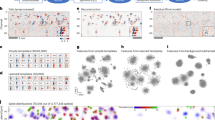Abstract
Optimization models help us to test our insight into the biological constraints that influence the outcome of evolution. They serve to improve our understanding about adaptations, rather than to demonstrate that natural selection produces optimal solutions.
This is a preview of subscription content, access via your institution
Access options
Subscribe to this journal
Receive 51 print issues and online access
$199.00 per year
only $3.90 per issue
Buy this article
- Purchase on Springer Link
- Instant access to full article PDF
Prices may be subject to local taxes which are calculated during checkout
Similar content being viewed by others
References
Maynard Smith, J. A. Rev. Ecol. Syst. 9, 31–56 (1978).
Maynard Smith, J. Evolution and the Theory of Games (Cambridge University Press, 1982).
Alexander, R. M. Optima for Animals (Arnold, London, 1982).
Krebs, J. R. & Houston, A. I. in Ecological Concepts: the Contribution of Ecology to an Understanding of the Natural World (ed. Cherrett, J. M.) 309–338 (Blackwell, Oxford, 1989).
Stephens, D. W. & Krebs, J. R. Foraging Theory (Princeton University Press, Princeton, 1986).
Schmid-Hempel, P. in Population Biology (eds Wöhrmann, K. & Jain, S.) 321–347 (Springer, Berlin, 1989).
Mangel, M. & Clark, C. W. Dynamic Modelling in Behavioural Ecology (Princeton University Press, Princeton, 1988).
Gould, S. J. & Lewontin, R. C. Proc. R. Soc. B 205, 581–598 (1979).
Nisbet, R. M. & Gurney, W. S. C. Modelling Fluctuating Populations (Wiley, Chichester, 1982).
Fisher, R. A. The Genetical Theory of Natural Selection (Oxford University Press, London, 1930).
Hamilton, W. O. Science 156, 477–488 (1967).
Charnov, E. L. The Theory of Sex Allocation (Princeton University Press, Princeton, 1982).
Parker, G. A. & Stuart, R. A. Am. Nat. 110, 1055–1076 (1976).
Caswell, H. in Ecological Concepts (ed Cherrett, J. M.) (Blackwell, Oxford, 1989).
Hamilton, W. D. J. theor. Biol. 7, 1–52 (1964).
Wynne-Edwards, V. C. Evolution through Group Selection (Blackwell, Oxford, 1986).
Vrba, E. S. Syst. Zool. 33, 318–328 (1984).
Maynard Smith, J. & Savage, R. J. G. Zool. J. Linn. Soc. 42, 603–622 (1956).
Parker, G. A. & Hammerstein, P. in Evolution: Essays in Honour of John Maynard Smith (eds Greenwood, P. J., Harvey, P. H. & Slatkin, M.) 73–94 (Cambridge University Press, Cambridge, 1985).
Atkinson, D. in Behavioural Ecology: Ecological Consequences of Adaptive Behaviour (eds Sibly, R. M. & Smith, R. H.) 99–104 (Blackwell, Oxford, 1985).
Lack, O. Ibis 89, 309–352; 90, 25–45 (1947).
Lack, D. The Natural Regulation of Animal Numbers (Clarendon, Oxford, 1954).
Parker, G. A. & Macnair, M. R. Anim. Behav. 27, 1210–1235 (1979).
Maynard Smith, J. Anim. Behav. 25, 1–9 (1977).
Clark, C. W. Mathematical Bioeconomics (Wiley, New York, 1976).
Houston, A., Clark, C., McNamara, J. & Mangel, M. Nature 332, 29–34 (1988).
Pearson, R. G. & Parker, G. A. J. nat. Hist. 7, 573–589 (1973).
Charnov, E. L. Theor. Populat. Biol. 9, 129–136 (1976).
Von Neumann, J. & Morgenstern, O. Theory of Games and Economic Behaviour (Princeton University Press, Princeton, 1953).
Maynard Smith, J. & Price, G. R. Nature 246, 15–18 (1973).
Parker, G. A. in Behavioural Ecology: an Evolutionary Approach 2nd ed. (eds Krebs, J. R. & Davies, N. B.) 30–61 (Blackwell, Oxford, 1984).
Parker, G. A. in Behavioural Ecology: Ecological Consequences of Adaptive Behaviour (eds Sibly, R. M. & Smith, R. H.) 33–58 (Blackwell, Oxford, 1985).
Maynard Smith J. Am. Nat. 117, 1015–1018 (1981).
Yoshimura, Y. & Shields, W. M. Evol. Ecol. 1, 125–138 (1987).
Selten, R. Math. Soc. Sci. 5, 269–363 (1983).
Maynard Smith, J. & Parker, G. A. Anim. Behav. 24, 159–175 (1976).
Davies, N. B. Anim. Behav. 26, 138–147 (1978).
Kummer, H., Götz, W. & Angst, W. Behaviour 49, 62–87 (1974).
Sigurjónsdóttir, H. & Parker, G. A. Behav. Ecol. Sociobiol. 8, 219–230 (1981).
Reichert, S. E. Behav. Ecol. Sociobiol. 6, 121–128 (1979).
Schmid-Hempel, P., Kacelnik, A. & Houston, A. I. Behav. Ecol. Sociobiol. 17, 61–66 (1985).
Pyke, G. H. Oecologia 36, 281–293 (1978).
Nunez, J. J. apic. Res. 21, 139–150 (1982).
Schmid-Hempel, P. & Wolf, T. J. Anim. Ecol. 57, 500–521 (1988).
Wolf, T. H. & Schmid-Hempel, P. J. Anim. Ecol. 58, 943–954 (1989).
Wolf, T. H., Schmid-Hempel, P., Ellington, C. P. & Stevenson, R. D. Funct. Evol. 3, 417–424 (1989).
Schmid-Hempel, P. J. Anim. Ecol. 56, 209–218 (1987).
Pagel, M. D. & Harvey, P. H. Q. Rev. Biol. 63, 413–416 (1988).
Clutton Brock, T. H., Harvey, P. H. & Rudder, B. Nature 269, 797–800 (1977).
Lande, R. Evolution 34, 402–416 (1979).
Lande, R. & Arnold, S. J. Evolution 37, 1210–1226 (1983).
Rose, M. & Charlesworth, B. Nature 287, 141–142 (1980).
Lamb, M. J. J. Insect Physiol. 10, 487–497 (1964).
Lande, R. Proc. natn. Acad. Sci. U.S.A. 78, 3721–3725 (1981).
Kirkpatrick, M. Evolution 36, 1–12 (1982).
O'Donald, P. Genetic Models of Sexual Selection (Cambridge University Press, Cambridge, 1980).
Grafen, A. J. theor. Biol. 144, 473–546 (1990).
Stearns, S. & Schmid-Hempel, P. Oikos 49, 118–125 (1987).
Pierce, G. J. & Ollason, J. G. Oikos 49, 111–118 (1987).
Author information
Authors and Affiliations
Rights and permissions
About this article
Cite this article
Parker, G., Smith, J. Optimality theory in evolutionary biology. Nature 348, 27–33 (1990). https://doi.org/10.1038/348027a0
Issue Date:
DOI: https://doi.org/10.1038/348027a0
This article is cited by
-
Experimental quantification of genetic and ontogenetic effects on fighting behavior in the broad-horned flour beetle
Behavioral Ecology and Sociobiology (2024)
-
School of Rocks: a Transmission Time Investment Model for Pleistocene Lithic Technology
Journal of Archaeological Method and Theory (2024)
-
Information encoded in volumes and areas of dendritic spines is nearly maximal across mammalian brains
Scientific Reports (2023)
-
Post-injury pain and behaviour: a control theory perspective
Nature Reviews Neuroscience (2023)
-
How competition between overlapping generations can influence optimal egg-laying strategies in annual social insects
Oecologia (2023)
Comments
By submitting a comment you agree to abide by our Terms and Community Guidelines. If you find something abusive or that does not comply with our terms or guidelines please flag it as inappropriate.



